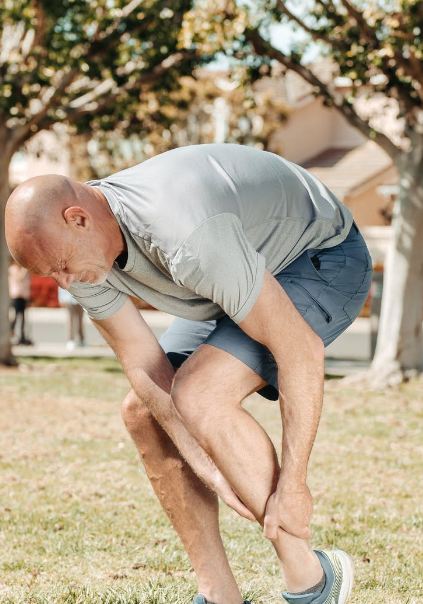Walking is a free-of-cost, easy-to-do exercise that offers several health benefits to people of all ages. It is the best way to maintain a healthy lifestyle and thus prolong your lifespan. Following are some of the highly beneficial effects of walking:
1. Maintain a Healthy Weight
Walking regularly increases the body’s metabolism, which burns extra calories, thus preventing muscle loss. Moreover, you can easily burn up to 90 to 200 calories during a 30-minute walk, depending on your walking speed. For this reason, walking is considered one of the most powerful ways to burn calories and maintain a healthy weight.
A research study by JAMA Internal Medicine concluded that excessive weight gain can be effectively prevented by a daily 30-minute walk. However, the actual calorie burn depends on the following factors:
- Pace of walking
- Distance covered
- Your current weight
- Walking track (for instance, you will burn more calories if you walk on the ground, including hills, rather than walking on a flat surface)
For better results, try to follow these basic guidelines:
- The outdoor walk should constitute a ground with hills.
- In 30 minutes, brisk walking can help you burn up to 150 calories (for a 175 pounds person).
- Try different walking paces every day. For example, go for both the speed walk and a slower pace walk. (Strolling at a moderate pace for a long interval will not be effective enough. On the other hand, if you gradually increase the speed of your walk, you can burn more calories).
- Walk on the same routes every other day. This will keep you motivated to break your previous records.
- Aim high for an extra boost of motivation. Try to accomplish a target of 10,000 steps each day.
- Intervals are a much-needed element. Try to add intervals to your walking routine. Do a warm-up for 2 minutes, and then start walking again.
- Determine your progress by checking calorie burn through a “calorie calculator.”
2. Helps Alleviate Joint Pain
In addition to lubricating your joints and making them healthy, walking is good for strengthening the surrounding muscles. Also, walking is a win-win situation if you cannot run because of any medical condition or simply if you don’t like running.
Walking is beneficial for patients suffering from a medical condition called arthritis, as it reduces joint pain. A 2019 study in the American Journal of Preventive Medicine shows that a daily walk of 30 minutes or more than an hour per week can effectively delay the arthritic pain for some years in a geriatric population. The study showed that the patients habitual of walking an hour every week were more likely to postpone the disability for the next four years.
3. May Boost Your Immune System
Walking is an efficient activity to improve the human immune system. Research shows that walking and all other activities that are of moderate intensity help enhance immunity.
The mechanism of action is that it multiplies the cells responsible for immunity by attacking the pathogens in our body. Ultimately, the tendency to get ill from any infectious disease (like flu or cold) is reduced. Another research has confirmed that the people who walk regularly are more likely to have shorter stays at hospitals.
The study researched 1,000 adults during flu season. Amongst the group, the ones who walked at moderate speed for at least 30 to 45 minutes were compared with the sedentary group of people. It was found that persons who found walking as a habitual activity had fewer sick days and overall less intensity of respiratory infection. Also, their symptoms were less severe when they got sick.
To experience all the immunity-based benefits of walking, you need to walk every day.
4. May Lower the Risk of Chronic Diseases
Walking has a huge number of physical as well as health benefits. Some studies show that systolic blood pressure can be reduced by 0.45 points for every 1000 steps daily.
Another most cited walking and health study published in The New England Journal of Medicine compared the individuals who walk enough to meet physical activity guidelines with those who do not walk regularly. The study found that there is a 30% less chance of cardiovascular disorders (like heart attack and stroke) amongst the ones who walk regularly.
Note: to avoid any kind of disease, longer walks are key. At Least one hour-long walk has to be done once or twice a week.
The evidence confirms that if a person walks every day for at least 30 minutes, there will be around 19% less risk for coronary heart disease. This percentage depends on the duration and the distance covered per day. For instance, you increase the duration, and the distance, the chances of getting chronic heart diseases will be reduced further.
5. Enhances Creative Thinking
According to the Journal of Experimental Psychology, Learning, Memory, and Cognition, a 2014 study shows that walking can boost creativity.
Creative-thinking tests were done on two groups. One was seated, and the other was walking. The researchers found that the persons who were thinking while walking/strolling turned out to be more creative than the ones seated. (The test was done on outdoor walkers)
This is because walking clears the mind and enhances the free flow of ideas. Thus, boosting the person’s creativity along with physical exercise.
Several studies are done on exercise and its correlation with enhanced creativity. One study found that the kids who walk on a treadmill are better with their academic scores. In another research, a brain scan of a person who does brisk walking thrice a week was done. It was then found that the part of the brain responsible for decision-making was more powerful than the one who attended the educational seminar.
Note: Next time, whenever you feel stuck at work, go for a walking meeting with your colleagues.
The mechanism of action is still unknown, but it is assumed that creativity is improved because of the enhanced blood flow to the brain as a result of exercise.
6. Helps Lower Blood Sugar Levels
There is a small study that turns out to be great news for busy folks. This study claims that even a short walk can produce great results. For instance, a short 15-minute walk after every meal (breakfast, lunch, and dinner) can improve blood sugar levels. A short post-meal walk is better than an empty stomach long walk of 45 minutes.
Although further research is needed to confirm the findings. For the time being, you can add a post-meal walk for 15 minutes as a part of your healthcare routine.
7. Helps Get You Better Sleep
A regular workout is key to get better sleep at night. This is because exercise naturally increases the effects of the sleep hormone – called melatonin.
In a 2019 study, it is evident that postmenopausal women (aged between 50 to 75 years) who were habitual of moderate to light physical activities turned out to snooze better at night than the sedentary group of women.
The improved sleeping effect may be because the exercise reduces pain and stress levels. So, the key factors for sleep disturbances or insomnia are minimized by regular walking.
8. May Lighten Your Mood
Walking releases endorphins – natural chemicals within the body to overcome sadness. The experimental research shows that a person can see the difference in his mood even after a short 10-minute walk. The effects will accelerate if you stroll through some greenery. Also, some studies show that walking along with boosting self-esteem can also minimize the anxiety level and elevate the depressed mood.
The probable cause of elevated mood is that walking modifies the central nervous system by releasing endorphins to decrease anger and hostility. The more steps you take while walking, the better your mood will be.
Whenever you are having a bad mood and want to freshen up a bit without talking to anyone, you can take a stroll of 10 to 15 minutes. You will instantly feel the difference.
Note: If you want to experience better results, aim for 30 minutes of brisk or any other kind of walking plan and continue it three days a week. Depending on your stamina, you can also take breaks.
9. Helps You Live Longer
When compared the inactive individuals with frequent walkers, a recent study found that a moderate-intensity walk (just like brisk walking) for about 10 to 59 minutes per week can lower the risk of death by 18%. On the other hand, there is a 31% reduced risk of death in people who accomplished the aim of a weekly 150 minutes of walking exercise in at least a 10-minute sprint.
It is assumed that the benefit is because of the cardiovascular workout while walking.
Amongst the British individuals, an analysis comprising 11 surveys was made. In the end, it was found that fast walkers had the lowest mortality risks. (24% versus 20% for the “average” walkers). On the other hand, moderate pace walkers are better than slow walkers. Hence, this shows that the faster you walk, the lesser will be the risk ratio.
10. Boost Your Energy Levels
It’s always better to go for a walk after a tiring day than grabbing a cup of coffee. Walking increases the flow of oxygen and reduces serotonin, dopamine, and norepinephrine levels in the body. These are some hormones that play an important role in human energy levels.
Conclusion
Whether you are new to exercising or have been active throughout, walking can be a great choice of physical activity because of its numerous benefits. It can reduce the risk of chronic diseases as well as seasonal infectious illnesses. Regular walking can also help elevate your mood and energy levels.
Last but not least, a regular walking routine will let you accomplish your other daily goals.



